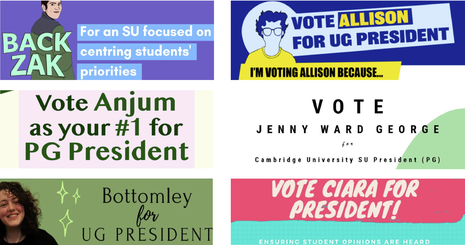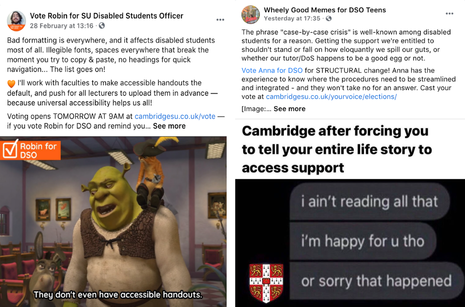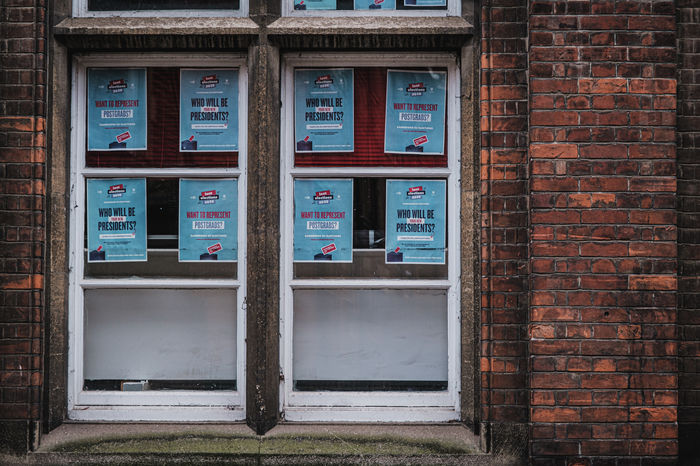
Memes, screens, and pot plants: Here’s how SU candidates are trying to secure your vote
As we enter the final 24-hours of voting in this year’s elections, Varsity examines candidates’ digitised campaign methods, and asks them about their experiences

As the final 24-hours of the voting period approaches, candidates’ campaigning is at a peak, with a constant stream of social media posts coming from many potential officers for the 2021-22 academic year.
Ben Margolis, current SU Undergraduate President, told Varsity that £100 worth of plants would be given to the JCR and MCR with the highest turnout in the elections, which will be used to decorate communal areas within the college. Last year, he added, a pizza party was offered to those with the highest turnout, but the prize has been adapted due to the pandemic.
This year, Facebook has become the primary medium for campaigning. As in previous years, colourful profile frames and slogans have emerged, encouraging friends to vote over the four-day period that voting is open.
This has included a series of endorsements, among the most notable being those from the Cambridge Rent Strike Campaign and the Cambridge University Liberal Association.
The Rent Strike’s endorsements noted that Allison O'Malley Graham, UG President candidate, Ewan Hawkins, Welfare and Communities officer candidate, and Tara Choudhury, BME Officer candidate, “have all worked tirelessly to support the rent strike.”
The campaign has also endorsed Anjum Nahar for PG President, Anna Ward for Disabled Students’ Officer, Alex Roberts for UG Access, Education and Participation officer and Charli Hendy for University Councillor. The same candidates received endorsements from Cambridge Defend Education earlier today (03/03).
Cambridge Zero Carbon Society also endorsed Anjum for PG president, as well as Ewan, and Charli, but favoured Zak Coleman for UG President.
Meanwhile, Zak and Alex received their second endorsements from the Cambridge University Liberal Association (CULA), which also gave Jenny Ward George, PG President candidate, and Freddie Poser, CULA's Chair, who is looking to be re-elected as University Councillor, their first endorsements.
Videos have emerged again as a medium for candidates trying to get their messages across, although over the years they have been utilised with varying success.
In 2019, unsuccessful presidential candidate Shahdab Ahmed wrote and sang an access-themed version of Niall Horan’s ‘Slow Hands’. In 2020, candidate Henry Wright (also unsuccessful) achieved over 1200 views on Youtube for his video featuring “two sceptical students” trying to decide who to vote for.
It is unlikely that any candidates’ video will achieve a similar number of video views this year, with only two days left to vote.

However, notable videos this year include undergraduate Presidential candidate Allison’s Taylor Swift parody “Hey Stephen (Toope)”, featuring lyrics such as: “Hey Stephen/ Know you charge them loads of fees, yeah?/ Then give them housing and Brexit help”.
Zak, meanwhile, parodied Shania Twain's "That Don't Impress Me Much", with lyrics including: "Ooh, ooh, net zero 2030/ Ooh ooh, Shell and BP goodbye".
Meanwhile, the candidates for Disabled Students’ Officer have both embraced the use of memes.
Robin Denham’s pages have featured a steady flow of images on topics such as the Disabilities Resource centre and the University’s pandemic response. Anna has created the page ‘Wheely Good Memes for DSO Teens’, with memes addressing issues such as content notices and exam mitigations.
This is not the first time candidates have used memes for campaigning purposes: for his run in 2020, SU Undergraduate President Ben Margolis created ‘Margolis Memes for Presidential Teens’.
Several candidates talked to Varsity about their experiences with online campaigning. While most acknowledged the drawbacks of social isolation and burnout as a result of the pandemic, all three candidates for President (UG) highlighted some positive aspects of online campaigns.
Zak said: “I'm [...] slightly relieved not to be running all around Cambridge 24/7 like candidates normally do.” Allison similarly highlighted the drawbacks of in-person campaign events, saying: “not everyone [in previous years] could make it to hustings for accessibility reasons [and] not all candidates were as physically able to be running around faculties, etc.”
This was echoed by Amy Bottomley: “a candidate with accessibility requirements may be unable to access the same physical spaces to campaign as other candidates.”
Have YOU voted yet? Democracy is so fetch! Make sure to get your voice heard in these SU elections and go vote: https://t.co/BOZVTlg3fU
- Vote Milo for Women's Officer (@milo4womens2021) March 3, 2021
Be poggers. Vote Milo. pic.twitter.com/52gqFoWPOH
Meanwhile, Ciara Aberdeen explained how online campaigning benefitted them personally: “I’m someone who can be very shy in public in person, whereas I’m quite used to social interaction online, so I probably wouldn’t even have run [during a normal election year]”.
The access potential was further highlighted by Amelia Jabry, the candidate for postgraduate Access, Education & Participate Officer, who told Varsity that a recent hospital visit, on top of the demands of exam work, has meant she wouldn’t have been able to walk around to deliver leaflets.
Similarly, Milo Eyre-Morgan, candidate for Women’s Officer, highlighted the health benefits, saying: “As an autistic person who's been on campaign teams in previous years, I can definitely say in person campaigning is exhausting on a sensory and social level.”
Zaynab Ahmed, candidate for undergraduate Access, Education & Participate Officer, pointed out the environmental benefits of not using printed leaflets, and that “campaigning online might encourage students from minority backgrounds that they too can study at Cambridge one day!”
However, most candidates felt that these online elections have also brought particular strains and challenges.
Both candidates for University Councillor expressed regret at not being able to meet votes face-to-face. Charli said: “It's a real shame that a lot of the personal aspect of things has to be lost this year - I definitely would have liked to be able to see some actual faces at hustings!”, while Freddie said he regretted “not to be able to get out and talk to people in person about the campaign.”
In previous years, candidates have made a visible presence around University sites a cornerstone of their campaigns. In 2019, successful presidential candidate Edward Parker-Humphreys frequently wore a trademark blue, red and white coat to build a campaign brand.
This year, both candidates for postgraduate president expressed concerns about not being able to reach enough voters. Jenny said: “I’ve done online campaigning before, for my role as Peterhouse MCR President last summer. This time, though, the electorate is far larger and the challenge remains the same: trying to tell as many people as possible about my policies and why they should vote for me!”
Meanwhile, Anjum told Varsity: “I’m [...] worried about not reaching a broad enough voter base. For this to be democratic, candidates need to focus on reaching people who they usually wouldn't interact with but this is much harder to do online.”
She added: “What's been difficult about campaigning is not being able to wind-down afterwards and make it a more sociable experience.”
Finally, candidates expressed regret at the exhaustion that can often result from so much screen time. Zak said: “I think online campaigning can be very strange and draining (especially after making the 10th infographic of the day!)”.
Allison similarly explained that “being able to go for walks or just sit and have a cup of tea with friends is something I’ve been relying on”, while Ciara was grateful for being able to rely upon “quite a big campaign team”, saying: “I couldn’t even imagine how they must be feeling right now given how exhausted I’ve been.”
Amy meanwhile argued that “just as there have been barriers to teaching for many students – lack of adequate study space, lack of reliable access to resources or the internet, lack of time due to living constraints or caring responsibilities to name a few – those same barriers exist for some candidates during this year's online campaign.”
Anna also explained: “As with online teaching, it's much more accessible for me in physical terms, although I do struggle with 'screen fatigue' as I'm sure many of us do!”
Robin said that he thinks “a lot of the stress is from uncertainty outside of the campaign, e.g. the COVID situation and concerns about exam mitigations.”
Meanwhile, an anonymous Camfess post highlighted the severe negative effects of campaigning remotely: “Some candidates are lucky enough to be living with friends or loved ones who can keep them grounded or help them with campaigning, but the rest of us are going it alone and my brain has turned to mush. I wouldn't wish this on my worst enemy.”
You can cast your vote here in the election until 5pm tomorrow (04/03)
 News / Hundreds of Cambridge academics demand vote on fate of vet course20 February 2026
News / Hundreds of Cambridge academics demand vote on fate of vet course20 February 2026 News / Judge Business School advisor resigns over Epstein and Andrew links18 February 2026
News / Judge Business School advisor resigns over Epstein and Andrew links18 February 2026 News / Petition demands University reverse decision on vegan menu20 February 2026
News / Petition demands University reverse decision on vegan menu20 February 2026 News / University Council rescinds University Centre membership20 February 2026
News / University Council rescinds University Centre membership20 February 2026 News / CUCA members attend Reform rally in London20 February 2026
News / CUCA members attend Reform rally in London20 February 2026











